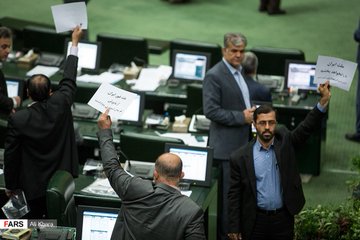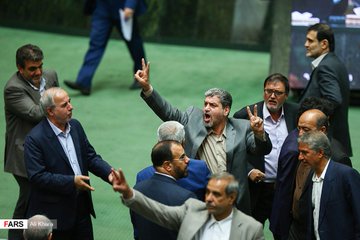RFL/RE – The floor of Iran’s parliament descended into chaos this week as lawmakers debated joining an international effort to choke off funding for terrorist groups, with lawmakers storming the speaker’s dais, complaining of “colonialism,” and holding aloft notes of protest amid the din.
The May 22 session was scheduled to review a bill on the country’s accession to the International Convention for the Suppression Of Financing Of Terrorism, also known as the Terrorism Financing Convention, a resolution adopted by the UN in 1999.
Local media quoted conservative lawmakers decrying it as a “colonial bill” that would allow foreign influence over the country and demanding that speaker Ali Larijani remove it from parliament’s agenda.
Hard-liners have suggested that enemies abroad could use the fight against terrorism to demand action against Iranian officials, including the commander of the Islamic Revolutionary Guards Corps’ (IRGC) Quds Force, a key instrument in Iran’s clandestine operations abroad.
The current bill was also discussed at a May 20 closed session in parliament, during which Foreign Minister Mohammad Javad Zarif and several other cabinet members reportedly tried to convince lawmakers that adopting the bill would not hinder Iran’s support for the “resistance groups” that a number of countries define as terrorists.
Images from parliament showed some lawmakers holding printed signs that read: “The Iranian nation will not forgive us,” and “The brave Iranian nation hates accepting any colonialist bill.”
The legislators eventually voted to send the bill to parliament’s National Security and Foreign Affairs Committee for further evaluation, Iranian media reported.
The world’s financial-crimes watchdog, the intergovernmental Financial Action Task Force (FATF), which promotes policies to protect the global financial system from money laundering, terrorist financing, and the financing of proliferation of weapons of mass destruction, has given Tehran until June to enact legislation banning terrorist financing and money laundering to allow FATF to remove Iran from its blacklist.
Getting off the list could make it easier for Iran to access Western financial institutions and facilitate trade and investment in the country as promoted by President Hassan Rohani, who has also attempted to curb the role of the IRGC in Iran’s economy.
A number of European countries are currently scrambling to shield their companies from U.S. sanctions expected to follow President Donald Trump’s decision to abandon 2015’s multilateral nuclear deal giving Tehran sanctions relief in exchange for limits on its controversial nuclear activities.
Iran’s conservatives are concerned that adhering to FATF obligations could hurt the operations of the IRGC, a branch of the military that plays a major role in Iran’s economy and provides support to like-minded groups abroad.
Ali Vaez, a senior Iran analyst at the International Crisis Group, says hard-liners see FATF as “the next way station in the slippery slope of compromises that Rohani’s administration is making to the West in vain.”
“They also fear that more transparency endangers their vested interest in the country’s black market,” Vaez adds, an allusion to the IRGC’s long fingers in Iran.
‘Resistance’ Or ‘Terrorists’?
Alaedin Borujerdi, the head of parliament’s National Security and Foreign Policy Committee, said lawmakers are concerned that the bill could block Iranian relations with groups like Hamas and Hizballah, which Iran considers resistance groups.
Hamas, a fundamentalist Sunni group that has controlled the Gaza Strip for a decade, and Hizballah, a Lebanese-based Shi’ite militant group that is also allied with Tehran in its support of Syrian President Bashar al-Assad, are designated as terrorist organizations by the United States and European Union, among others.
Speaking out against the bill, Iranian lawmaker Aldolreza Mesri warned that joining it could force Tehran into extradition quagmires over key establishment figures, including Quds Force commander Qassem Soleimani, to face terrorism charges.
“Friends think this is merely a financial convention that we need for FATF,” he said. “Read the bill; most of it is about extraditing terrorists. Terrorism as defined by them. In their view, our Islamic Revolutionary Guards Corps is a terrorist organization.”
He then named a number of Iranian officials who have been blacklisted abroad for their alleged roles in the 1994 bombing of a Jewish community center in Buenos Aires that killed 85 people and injured hundreds more.
“In their view, who is a terrorist that we need to extradite so that they can face trial?” Mesri asked, going on to list former IRGC commander Mohsen Rezai, former Foreign Minister Ali Akbar Velayati, former Defense Minister Ahmad Vahidi, and Soleimani.
Lawmaker Hossein Naghavi Hosseini said the bill contravened Article 3 of the Iranian Constitution and would allow “foreign dominance” over the country.
The semiofficial Mehr news agency quoted an unnamed lawmaker as saying of the separate, closed-door debate on May 20 that “lawmakers were not convinced by Zarif’s arguments because they believe that by accession to the convention, the U.S. can file a complaint against Iran at the International Court of Justice for supporting Hizballah.”
The United States has designated Iran as a major sponsor or terrorism, and the Trump administration in scrapping its role in the Iranian nuclear deal cited its intention to combat Tehran’s missile program, its regional ambitions, its rights record, and its role in regional conflicts.
Last week, the U.S. Treasury Department slapped sanctions on the head of the Iranian Central Bank for “allegedly assisting in funneling millions of dollars on behalf of Iran’s Islamic Revolutionary Guards Corps’ Quds Force to support Lebanon’s Hizballah militia.”
 Shabtabnews In this dark night, I have lost my way – Arise from a corner, oh you the star of guidance.
Shabtabnews In this dark night, I have lost my way – Arise from a corner, oh you the star of guidance.
 نمایندگان مجلس با ارجاع مجدد لایحه الحاق ایران به کنوانسیون بینالمللی مبارزه با تأمین مالی تروریسم به کمیسیون امنیت ملی و سیاست خارجی موافقت کردند.
نمایندگان مجلس با ارجاع مجدد لایحه الحاق ایران به کنوانسیون بینالمللی مبارزه با تأمین مالی تروریسم به کمیسیون امنیت ملی و سیاست خارجی موافقت کردند. نشست علنی امروز مجلس/جمعی از نمایندگان برای مسکوت ماندن گزارش کمیسیون امنیت درباره لایحه مبارزه با تامین مالی تروریسم اعتراض کردند.
نشست علنی امروز مجلس/جمعی از نمایندگان برای مسکوت ماندن گزارش کمیسیون امنیت درباره لایحه مبارزه با تامین مالی تروریسم اعتراض کردند. 








